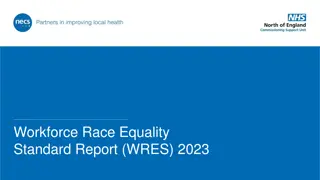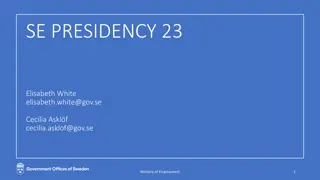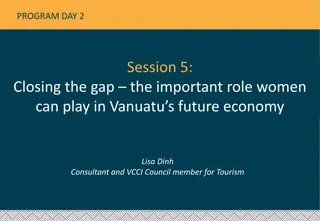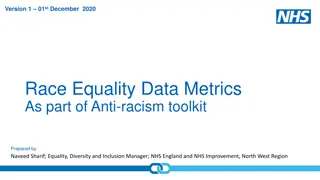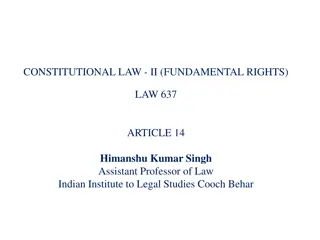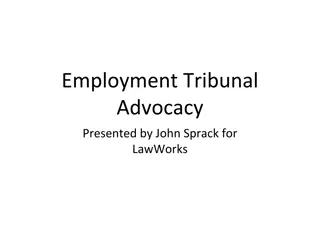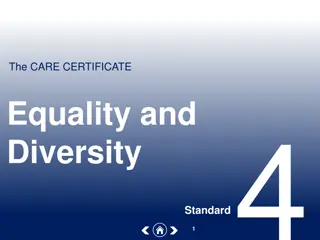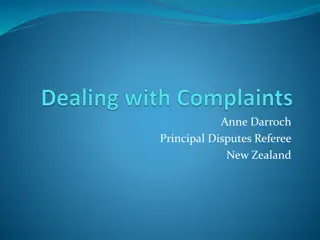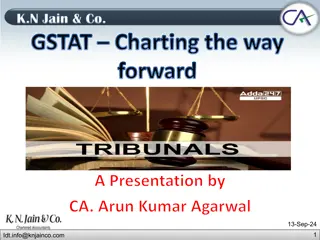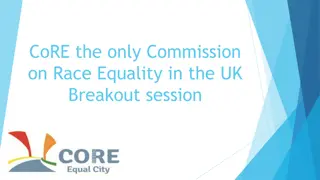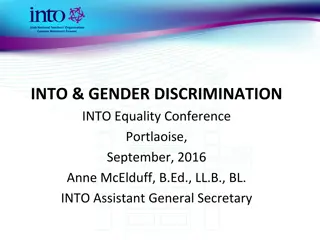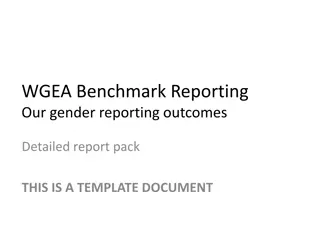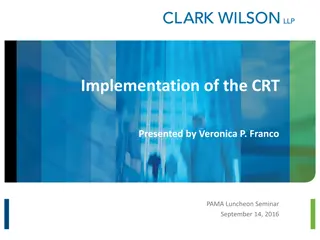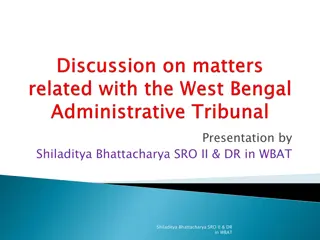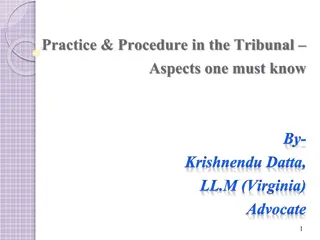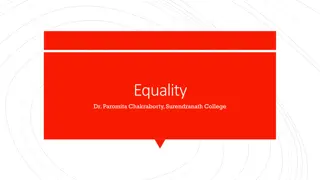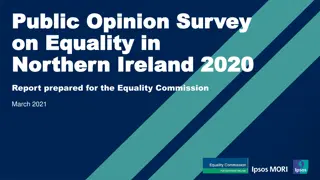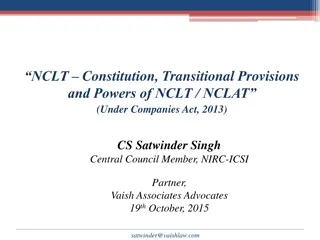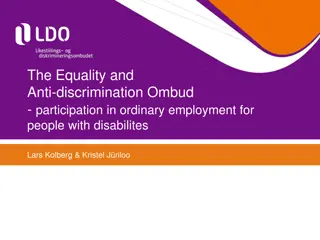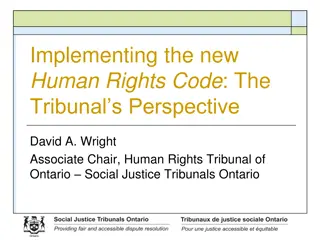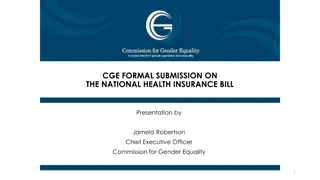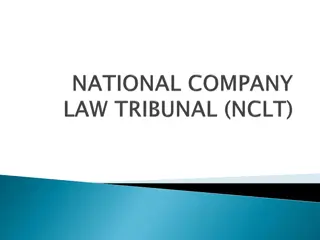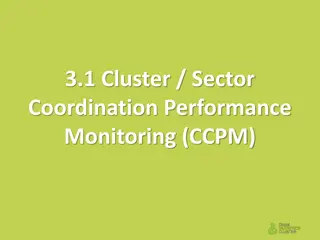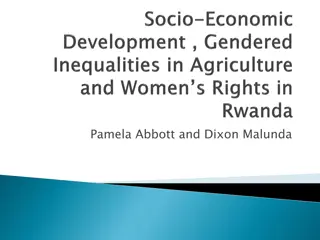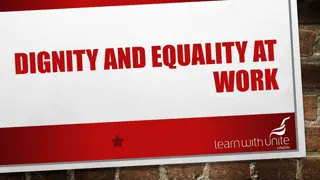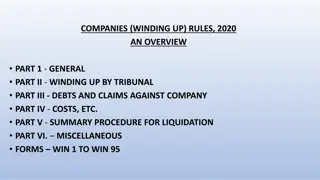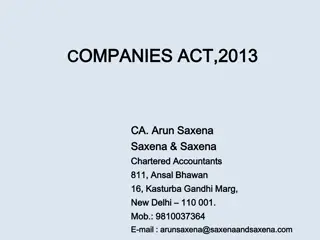NHS Coventry and Warwickshire Integrated Care Board Workforce Race Equality Standard Report 2022-2023
This report presents the findings of the Workforce Race Equality Standard (WRES) for the NHS Coventry and Warwickshire Integrated Care Board for the year 2022-2023. It outlines key indicators, action plans, and commitments to drive change towards racial equality in the workplace, focusing on data an
1 views • 17 slides
Workforce Race Equality Standard Report (WRES) 2023 Overview
The Workforce Race Equality Standard (WRES) was introduced by the NHS in 2015 to address workplace inequalities between Black, Asian, and Minority Ethnic (BAME) staff members and White staff members. The WRES aims to ensure equal access to career opportunities and fair treatment for employees from d
1 views • 17 slides
Gender Mainstreaming Activities in SE Presidency 2023
The content highlights various gender mainstreaming activities and events scheduled for SE Presidency 2023, focusing on gender equality in different sectors. It includes conferences, high-level meetings, and initiatives promoting gender mainstreaming measures. Government offices are implementing dec
0 views • 5 slides
Empowering Women for Economic Growth: Lessons and Strategies
The role of women in Vanuatu's future economy is highlighted in Session 5, emphasizing the economic benefits of gender equality. Insights from global examples underscore how closing the gender gap leads to enhanced economic efficiency. Practical approaches such as Gender-Sensitive Budgeting and Gend
0 views • 9 slides
Race Equality Data Metrics & Key Indicators in Workplace: An Anti-racism Toolkit
Race Equality Data Metrics & Key Data Indicators play a crucial role in assessing workplace race equality. Developed by Naveed Sharif, this toolkit provides 6 essential metrics focusing on leadership, recruitment, and formal workplace processes. The toolkit aims to address disparities and promote eq
2 views • 11 slides
Enhancing Race Equality Initiatives: Projects and Progress Update January 2023
The GMB is implementing recommendations by Dr. Elizabeth Henry to further race equality initiatives. Key projects include kick-starting race equality campaigns, targeted training for minority ethnic activists, and support schemes for staff. Emphasis is on valuing existing achievements in regions and
2 views • 7 slides
Understanding Fundamental Right to Equality in Indian Constitution
The concept of equality before the law and equal protection of laws as enshrined in Articles 14 to 18 of the Indian Constitution are essential for ensuring equal status and opportunities for all citizens. Article 14 ensures equality before the law, prohibiting the state from denying any person equal
1 views • 10 slides
Strategies for Effective Tribunal Advocacy in Employment Cases
Practical guidance on preparing for and presenting a case at an Employment Tribunal, covering disputed legal and factual issues, persuasion tactics, witness preparation, dealing with opposing witnesses, hearing procedures, and effective questioning techniques, all illustrated with images for better
0 views • 17 slides
Promoting Equality, Diversity, and Inclusion in Care Settings
Understanding the importance of equality and inclusion, working inclusively, and accessing information on diversity are crucial aspects of providing fair care. Promoting equality ensures individuals are not discriminated against, and addressing discrimination through person-centered care, non-judgme
0 views • 8 slides
NHS Sussex Workforce Race Equality Standard (WRES) Report 2023
NHS Sussex is committed to promoting equality and diversity within its workforce, as reflected in the latest Workforce Race Equality Standard report for 2023. Despite facing challenges such as significant organizational changes, limited recruitment, and internal restructuring, the report indicates s
0 views • 11 slides
Judicial Processes and Misconduct in New Zealand Disputes Tribunal
The New Zealand Disputes Tribunal, led by Principal Referee Anne Darroch, handles civil claims up to $15,000 or $20,000 by consent, with over 60 referees managing 16,000-20,000 claims yearly. Limited appeal rights are in place, with a complaints mechanism under process for all New Zealand Tribunals
0 views • 22 slides
Understanding GSTAT - A Comprehensive Overview of Goods and Services Tax Appellate Tribunal
Explore the key aspects of the Goods and Services Tax Appellate Tribunal (GSTAT) including its constitution, procedures, and significance in the realm of taxation. Learn about the stages of litigation, the role of GSTAT in appeals, and essential tips for effective appeal presentations. Discover the
0 views • 37 slides
Advancing Gender Equality in Research Performing Organizations: LeTSGEPs Project in Serbia
This project, funded by the European Union's Horizon 2020 program, focuses on implementing Sustainable Gender Equality Plans in research organizations in Serbia. The initiative aims to promote gender equality through various national policies, institutional frameworks, and the efforts of entities li
0 views • 17 slides
Bristol Commission on Race Equality - Empowering Communities for Equality
Bristol Commission on Race Equality (CoRE) aims to advance race equality in the UK through community engagement, strategic objectives, and support for marginalized communities. The commission works towards creating an inclusive, cohesive, and thriving city where all individuals, regardless of race,
0 views • 9 slides
Workplace Health and Safety Regulations Overview
Explore key aspects of workplace safety laws and regulations, including employer duties, employee responsibilities, bullying and harassment prevention, and procedures for handling complaints. Learn about the Equality Tribunal, safety officers, risk assessments, and more to ensure a safe work environ
0 views • 43 slides
Employment Law Cases Update: Disability Discrimination - February 2017
Private Medicine Intermediaries Ltd v. Hodkinson involved a case of constructive unfair dismissal and harassment due to a disabled employee being pressured to work long hours. The Employment Appeal Tribunal ruled that the expectation for the employee to work long hours constituted a discriminatory p
0 views • 16 slides
Finland's Commitment to Gender Equality and Women Empowerment
Finland stands out as a pioneer in gender equality, with a strong emphasis on women's rights and empowerment. Being the first country to grant women the right to vote and elect them to Parliament, Finland showcases a society committed to equality in all aspects. From equal representation in the labo
0 views • 17 slides
Workplace Gender Equality Agency Benchmark Report Summary
Detailing our organization's journey towards gender equality as per the Workplace Gender Equality Act 2012 requirements, this report highlights our priorities, achievements, strategies, and outcomes. It showcases our areas of strong performance, key decision points, and industry benchmarks. By focus
0 views • 18 slides
Understanding the Civil Resolution Tribunal (CRT)
Civil Resolution Tribunal (CRT) is introduced as a place to resolve strata-related disputes in an accessible, speedy, and economical manner. It aims to encourage agreement between parties or decide claims. CRT's mandate includes providing fair dispute resolution services using electronic tools. The
0 views • 38 slides
Progress of Gender Equality in Bulgaria: A Review from a Gender Perspective
Bulgaria has made significant progress in implementing gender equality through its legal framework and international human rights instruments. The country has established laws protecting against discrimination and domestic violence, as well as promoting equality between women and men. Initiatives su
0 views • 18 slides
Achieving Gender Equality and Women's Empowerment in Bulgaria: A Review of CSW 60 Agreed Conclusions
The presentation at the Permanent Mission of the Republic of Bulgaria to the United Nations highlighted Bulgaria's commitment to gender equality and women's empowerment through legal frameworks, policy initiatives, and leadership roles. The country has made significant strides in strengthening laws
0 views • 8 slides
Overview of Administrative Tribunal Proceedings in WBAT
Administrative Tribunal proceedings in WBAT are governed by Article 323A of the Constitution. The tribunal is headed by a Chairman, with benches comprising a Judicial Member and an Administrative Member. Cases are either contested by advocates or departmental representatives. Specific procedures are
0 views • 19 slides
Key Aspects of Practice & Procedure in Tribunals for Advocates
This informative content by Krishnendu Datta, LL.M. (Virginia) Advocate covers essential aspects of practice and procedure in tribunals. It discusses concise narration of material facts, specific instances of oppression and mismanagement, interim and final reliefs, powers of the tribunal under Secti
0 views • 13 slides
Understanding Equality in Politics and Society
Equality is a complex concept encompassing equal rights, treatment, opportunities, and distribution of wealth. Legal equality ensures equal protection under the law, while social equality aims for equal rights and opportunities without discrimination. Liberty and equality are often seen as opposing
0 views • 5 slides
Public Opinion Survey on Equality in Northern Ireland 2020 Report Summary
The report on public opinion regarding equality in Northern Ireland in 2020 highlights various aspects including awareness, understanding, personal experiences, attitudes, and views on equality and access to services. Key findings show a decrease in awareness, concerns about discrimination laws, sup
0 views • 49 slides
Evolution of NCLT and NCLAT Under Companies Act, 2013
The establishment and constitutional validity of the National Company Law Tribunal (NCLT) and National Company Law Appellate Tribunal (NCLAT) under the Companies Act, 2013 were upheld in a landmark judgment by the Supreme Court. The NCLT marks a new era in corporate adjudication, taking over jurisdi
0 views • 41 slides
Implementing Gender Equality Plans at ZRC SAZU, Slovenia
One of the largest research institutions in Slovenia, ZRC SAZU, is implementing Gender Equality Plans (GEPs) to improve gender equality in research organizations. The GEP project involves piloting organizations in Greece, Tunisia, Israel, Italy, Spain, Cyprus, and Slovenia. Research and analysis of
0 views • 8 slides
Ensuring Equality and Anti-Discrimination in Employment: The Ombud's Role
The Equality and Anti-Discrimination Ombud plays a crucial role in promoting ordinary employment opportunities for individuals with disabilities. Established in 2006, the Ombud integrates various offices and operates independently under the Ministry of Children, Equality, and Inclusion. It acts as a
0 views • 25 slides
Insights into Implementing Human Rights Code: Tribunal's Perspective
Providing valuable insights from the Human Rights Tribunal of Ontario's Associate Chair, David A. Wright, this presentation delves into key principles of the dispute resolution model, challenges faced, adaptations made, and future considerations. It highlights statistics, social areas, grounds for a
0 views • 35 slides
Effective Questioning Techniques in Tribunal Hearings
Effective questioning techniques are crucial in tribunal hearings to elicit accurate information from witnesses. Angela Dixon, Ph.D., emphasizes the importance of asking the right questions to engage participants and achieve optimal outcomes. Communication barriers, competency areas, and strategies
0 views • 32 slides
Submission on National Health Insurance Bill by Commission for Gender Equality
The Commission for Gender Equality in South Africa presents a formal submission on the National Health Insurance Bill. The submission highlights the importance of promoting gender equality in healthcare and ensuring access to quality health services for all, with a specific focus on women's health n
0 views • 23 slides
Understanding UNCT-SWAP Gender Equality Scorecard
The UNCT-SWAP Gender Equality Scorecard is an accountability framework aimed at enhancing planning, coordination, programming, and results for gender equality and women's empowerment at the country level. It evaluates the UN system's performance in gender mainstreaming based on global minimum requir
0 views • 16 slides
National Company Law Tribunal and Appellate Tribunal Definitions and Membership Criteria
The content outlines the definitions and membership criteria for the National Company Law Tribunal and Appellate Tribunal in detail. It covers the qualifications required for Judicial Members, Technical Members, and the President, as well as the selection process and powers conferred by the Central
0 views • 18 slides
Recent Case Laws in Corporate Laws - Economy Hotels India Services Pvt. Ltd. v. Registrar of Companies & ANR. (NCLAT)
In this case, Economy Hotels India Services Pvt. Ltd. filed a petition under Section 66 of the Companies Act for confirming the reduction of share capital. The National Company Law Tribunal (NCLT) rejected the application, but the National Company Law Appellate Tribunal (NCLAT) allowed the reduction
0 views • 21 slides
Cluster Sector Coordination Performance Monitoring (CCPM): Enhancing Gender Equality and GBV Protection
The CCPM framework allows for self-assessment of cluster performance in key areas like gender equality and protection against gender-based violence (GBV). It focuses on supporting service delivery with gender and inclusion considerations, strategic decision-making, gender-responsive strategy develop
0 views • 15 slides
Gender Equality and Rights: Insights from Research Projects and Policy Implementation
This content discusses gender equality and rights, drawing on various research projects funded by organizations like the World Bank and Oxfam UK. It covers topics such as political rights, property ownership, employment rights, gender-based violence laws, and the challenges in policy implementation
0 views • 18 slides
Gender Equality and Commitments for the Future in VLIR-UOS
The content showcases the importance of gender equality and the future commitments of VLIR-UOS through images and text. It emphasizes data availability, yearly monitoring, a 40-60% guideline, an advanced master program with a 45 age limit, a structural 2-track approach, gender policy, and interventi
0 views • 7 slides
Understanding the Equality Act 2010 and Protected Characteristics
The Equality Act 2010 aims to provide a legal framework to protect individuals' rights and promote equality of opportunity. It identifies nine protected characteristics including age, disability, race, gender, religion, and more. The Act prohibits discriminatory treatment in any category, particular
0 views • 29 slides
Companies (Winding Up) Rules, 2020: An Overview
The Companies (Winding Up) Rules, 2020 provide guidelines for winding up a company by the Tribunal under the Companies Act, 2013. The rules cover various aspects such as modes of winding up, circumstances under which a company may be wound up by the Tribunal, definitions, forms, and more. It specifi
1 views • 110 slides
Overview of Oppression and Mismanagement Provisions under Companies Act, 2013
This content provides detailed information about the provisions related to oppression and mismanagement as per the Companies Act, 2013. It outlines the eligibility criteria for members of shareholders to raise concerns, the power of the tribunal to intervene, and the possible orders that can be pass
0 views • 6 slides

